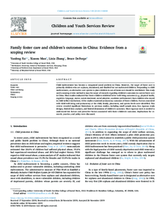Abstract
Child maltreatment has become a recognized social problem in China. However, the target of foster care is primarily children who are orphans, abandoned, and disabled but not maltreated children. Responding to child maltreatment, an alternative care system to place children in out-of-home care should be established. This study used a scoping review method to map the scope of research regarding children’s outcomes in current foster care in China. Most studies indicated that foster children exhibited better well-being outcomes (e.g., physical health, cognitive, language, motor, social-emotional, social adaptive, academic performance) than children who stayed in child welfare institutions. A few studies examined permanency outcomes of foster children. Factors associated with child well-being and permanency at the child, family, placement, and system levels were identified. This review revealed significant limitations in previous studies, including small sample sizes, less rigorous study designs, limited data analyses, and limited dimensions of children’s outcomes. More rigorous work is needed to understand risk factors and protective factors associated with foster children’s outcomes. Implications for research, practice, and policy were discussed.
View article here.

